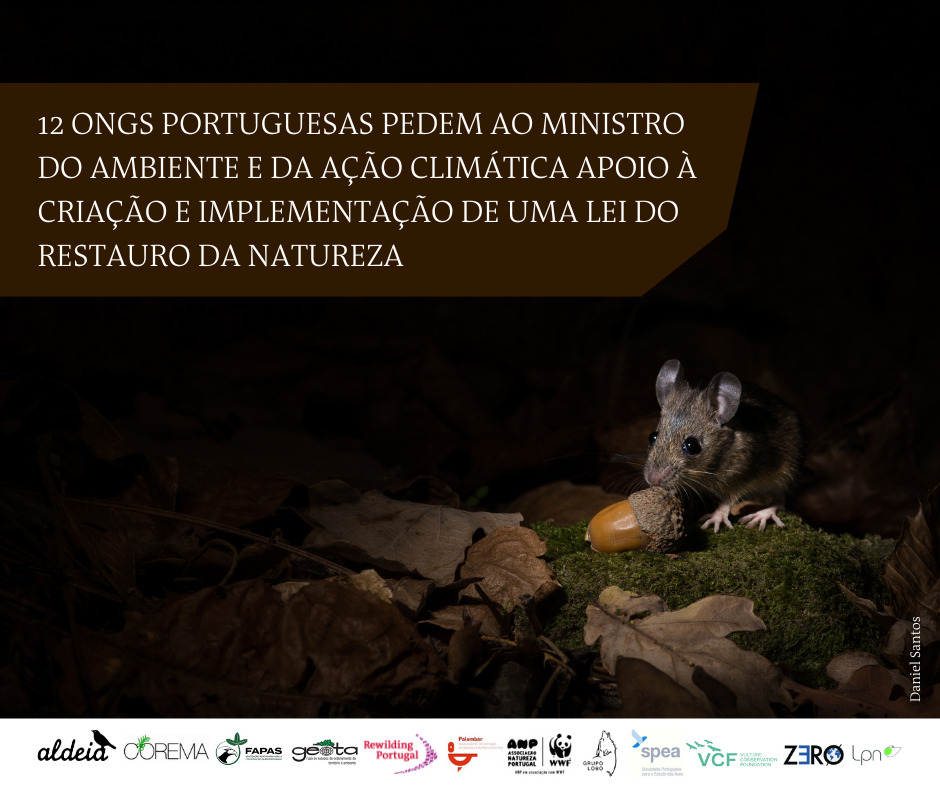Twelve Portuguese Environmental Non-Governmental Organizations sent an open letter to the Minister for the Environment and Climate Action, Duarte Cordeiro, asking him to express his support for the European Commission’s proposal for a Nature Restoration Law and his commitment to an expedited process at the next Environment Council, which will take place on December 20th.

Twelve Portuguese Environmental Non-Governmental Organizations sent an open letter to the Minister for the Environment and Climate Action, Duarte Cordeiro, asking him to express his support for the European Commission’s proposal for a Nature Restoration Law and his commitment to an expedited process at the next Environment Council, which will take place on December 20th.
The aim of this joint action is to reach an agreement as quickly as possible, without compromising the necessary level of ambition, in light of the climate and biodiversity crises and their impact on people and sectors of the economy in our country. Scientists, business and civil society in Portugal and across Europe have been demanding urgent action.
The proposed Nature Restoration Law offers a fundamental opportunity to bring nature back to Portugal and Europe, benefiting biodiversity, the climate and people. In the context of longstanding legal obligations under international law, the outcome of the UNFCCC COP27 and CBD COP15 negotiations are once again making it clear that it is necessary to jointly combat biodiversity decline and climate change for the well-being of the our society. Nature Restoration is an inherent part of the Global Biodiversity Framework solution (Goal 2). Nature Restoration is our best insurance policy for climate adaptation, ensuring greater resilience to droughts, floods and other extreme weather events. Consequently, it also contributes to long-term food security. Nature Restoration is undoubtedly one of the best investments Portugal can make.
Although we recognize that Portugal is still formulating its position on the proposed Nature Restoration Law, the signatories of this open letter intend to have the support of the Minister for the legal proposal at the Council meeting in December. Given the ongoing impact of the climate and biodiversity crises we are witnessing in Portugal, with the recent periods of historic drought and fires, it is of vital importance that the Minister expresses his commitment to strengthening the Restoration of Nature through the timely adoption of a robust position on the legal proposal.
We fully support the proposed Nature Restoration Regulation as a framework to reverse the tide of biodiversity loss and climate change that we have been witnessing on the necessary scale. In particular, some key elements were highlighted, which will allow the proposal to fully fulfill its potential:
- The legal proposal must include a strong global objective, to put effective restoration measures in place on at least 20% of the land and sea area of the European Union by 2030, to which all Member States must contribute in a fair and responsible way . This will increase flexibility for Member States and ensure a level playing field where all countries can contribute equally.
- The relationship with the joint recommendations of the Common Fisheries Policy must be clarified to prevent marine restoration objectives from becoming impractical.
- To ensure effective implementation of the Regulation, the legal proposal should pave the way for exploring and establishing dedicated funding for Nature Restoration in line with the mid-term review of the Multi-Annual Financial Framework.
- The timetable for implementing restoration measures needs to be brought forward. It takes some time for the benefits of Nature Restoration measures to materialise. Therefore, the measures need to be implemented sooner to ensure their effective contribution to the European Union’s 2050 climate neutrality target.
- Quantified and time-bound targets are needed for the restoration of rivers and their basins: 15% of the length of rivers (178,000 km across the European Union) must be restored in free-flowing rivers by 2030.
- Given that biodiversity decline and climate impacts are strongly visible in agricultural landscapes, high diversity landscape features should be implemented in at least 10% of agricultural land used by 2030.
- Peatlands are key ecosystems for both biodiversity and climate. Therefore, your restoration targets should be expanded to all drained bogs, which should be fully restored.
Signatory entities
Associação ALDEIA – Acção, Liberdade, Desenvolvimento, Educação, Investigação, Ambiente
ANP|WWF – Associação Natureza Portugal, em associação com WWF
Corema – Associação de Defesa do Património
FAPAS – Associação Portuguesa para a Conservação da Biodiversidade
GEOTA – Grupo de Estudos de Ordenamento do Território e Ambiente
Grupo Lobo
LPN – Liga para a Proteção da Natureza
Palombar – Conservação da Natureza e do Património Rural
Rewilding Portugal
SPEA – Sociedade Portuguesa para o Estudo das Aves
VCF – Vulture Conservation Foundation
Zero – Associação Sistema Terrestre Sustentável